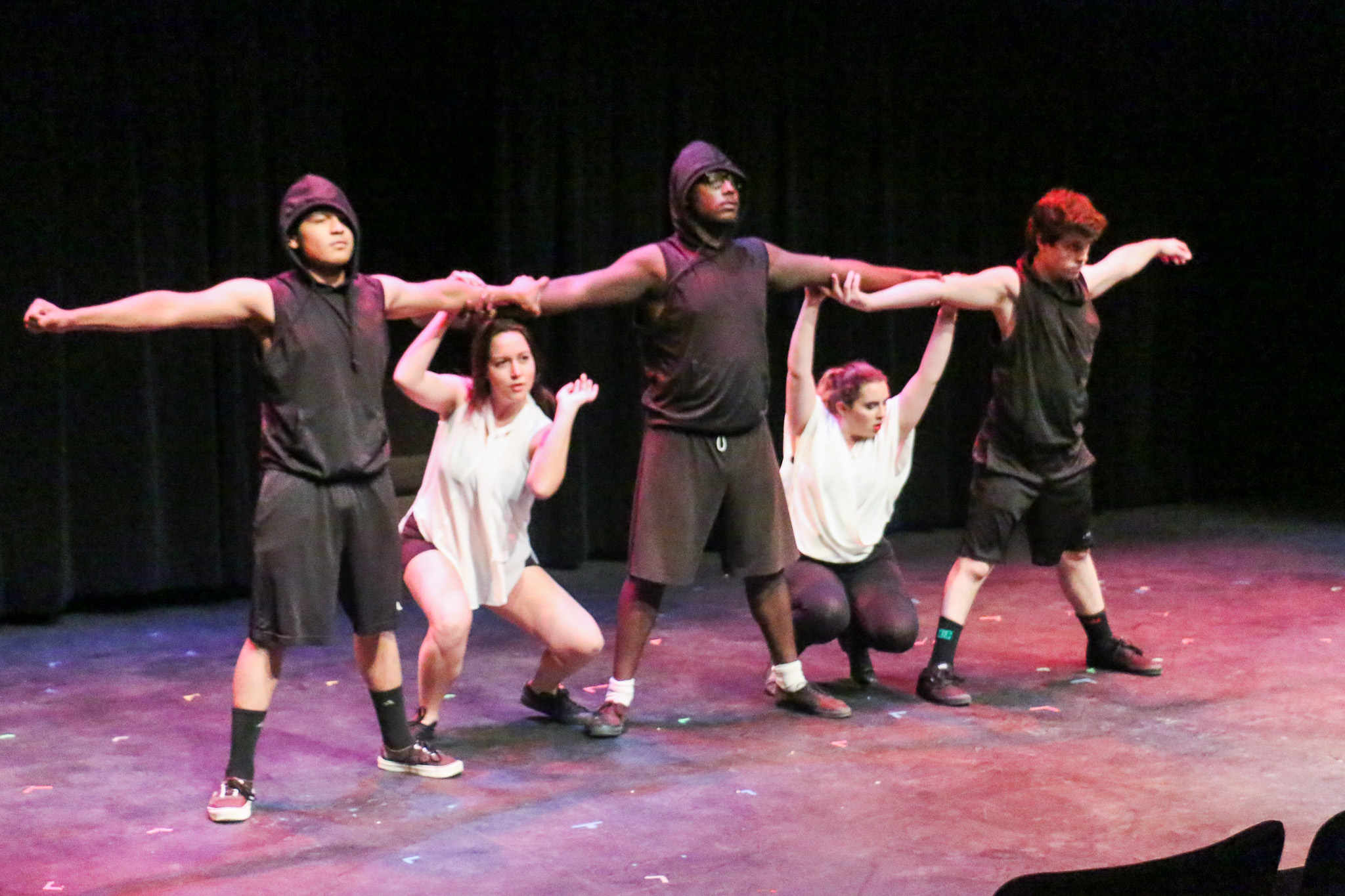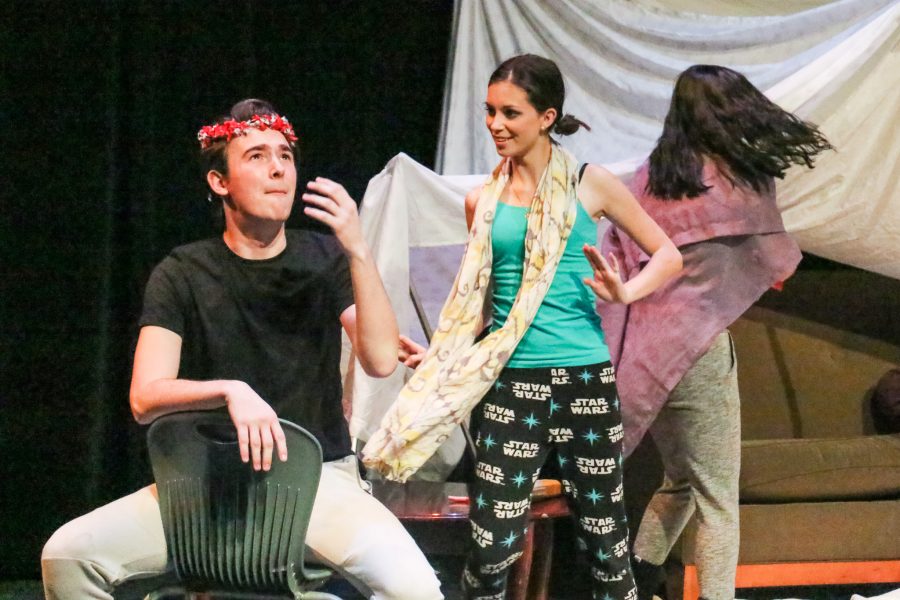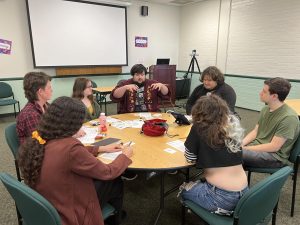‘Student One-Acts’ review: A deeper look at ‘Bill A’
From left, Seamus McLean, 19, Gillian Mansfield, 18, and Neida Franco, 19, participate in humorous storytelling and the building of a blanket-fort on Nov. 30 in the Black Box theatre of the campus Performing Arts Center during “Ever After,” one of 10 one-act plays performed as part of the Moorpark College’s student-run presentation the “Student One-Acts.”
December 12, 2016
Moorpark College’s “Student One-Acts” kicked off on Wednesday, Nov. 30, as both “Bill A” and “Bill B” each presented five student-run plays to those who made their way to the Black Box theater in the Performing Arts Center.
The Student Voice had the opportunity to sit down with the student actors, writers and choreographers behind “Bill A,” taking a back-stage look at what it took to pull off these successful plays from the scripts’ original intentions.
“Bill A” on Dec. 1, 3, 7, and 9 at 7:30 p.m. with a matinee presentation on Nov. 30 at 1:30 p.m.:
“Aphrodite’s Solicitation” by R. Christopher:
“Aphrodite’s Solicitation” follows the downward spiral of Electra, a stripper portrayed by Lilly D’Angelo-Cole, who finds herself in the transition to prostitution after being raped, beaten and lost of self-worth. Stuck in an all-time low, Electra is able to find hope from an unlikely source, giving her an ounce of strength in these dark times.
Perhaps the play’s most notable component was the intense series of dances, choreographed by 19-year-old Theatre Arts major and director Richard Gray.
“When I choreograph a dance, I try to make my dance tell a story,” said Gray. “The dance that I added [Beyonce’s] “Heaven” to, tells the story of one of the character’s mom who had a baby due to rape…[the son and the mom] would do the same choreography representing unity because she is forever bound to him now.”
Gray believes his dances’ choreography was used not only to tell part of the play’s story, but to enhance the one-act’s overall meaning.
“‘Aphrodite’s Solicitation’ conveys the message that people need to keep fighting,” said Gray. “Some people are going through hardships, but when it comes down to it, you can’t give up. You just gotta keep moving on.”

From left, Pablo Huchin, 19, Melanie Walsh, 19, Richard Gray, 19, Sharon Kriger, 20, and Kyle Buchanan-Prescott, 21, perform in a dramatic dance number in “Aphrodite’s Solicitation,” showcased in “Bill A” of Moorpark College’s Student One-Acts.
“Grunch” by Nicole St. Pierre:
Exploring the three main stereotypes that today’s society holds on women, was “Grunch” written and directed by Nicole St. Pierre. Located in an unknown magical vortex, three young women, Sierra Snaidman as the geek, Melanie Walsh as the airhead and Sharon Kriger as the tough-chick, immediately clashed personalities with one another.
The story of these three women is interrupted throughout the play by commercials that aim to mock the injustice women often face in their professional careers.
Snaidman, a 19-year-old undeclared major who portrayed Darla in “Grunch,” saw these fictional advertisements as the most powerful part of the play.
“[These commercials] were showing how in the workplace women face inequality,” said Snaidman. “[The lead actor in these commercials, played by] Nick Castro, was claiming how women don’t even know how to use a computer. This shows how women’s talents and skills sometimes go overlooked.”
According to St. Pierre, “grunch” means the sudden gut-wrenching feeling that you are not always considered equal to others.
“Ever After” by Mikki Benjamin:
On a more humorous side of the “Student One-Acts,” was Mikki Benjamin’s “Ever After.” Relatable to college students, “Ever After” tells the story of three high school best friends who face adversity when one of them breaks the news that she will be attending college out-of-state, putting the group’s future at risk.
Benjamin was inspired to write the story of these three close friends faced with a potential breakup, from her own personal experience of moving to Southern California from Illinois.
“Having that separation between friends is something that I lived with for a few years,” said Benjamin. “All of my friends were having that end of the year vibe where some of us were going off to universities next year and some of us were staying [local], and we were all struggling with it. It was something that was a common theme in my life, so I decided to write about it.”
As somebody who has gone through the difficult struggle of saying farewell to close friends and family on their way to college, Benjamin hopes this comedic one-act still holds important significance to those who saw it.
“I want people to think about how much they love their friends,” said Benjamin. “Even though their lives will be different if they may have lost those friends, they can still hold the things the friendship gave them.”
“I am Human” by Ariel Ostrowieck:
Through what felt like a poetry-slam, “I am Human” spotlighted the many barriers humans face that lead to us being judged differently by those around us. The actors and actresses on stage utilized posters and spoke in bold, poetic verses that emphasized these barriers to the audience.
Assistant director for the “Student One Acts” and 21-year-old English major Serena Aburahma weighed in on the importance of setting up the play in a poetry-slam fashion.
“When people hold the posters in the play and throughout all the poems, they’re discussing all the barriers that confine us as people,” said Aburahma. “Whether it be race, sex or just anything that keeps you from becoming the best you can be when interacting with people.”
The one-act acted as a call to action, demanding the need for us as individuals to put aside our differences and judge each other for who we are and not for our background and demographics.
“I hope students can see that regardless of the confines and the barriers that tell you to stay in the place that you should be, that you can keep fighting to break these stereotypes,” said Aburahma.
“Speak” by Ariana Burrell:
“Speak” followed the story of a young couple, played by Gillian Mansfield and Ian Sutton, madly in love during their senior year of high school. A seemingly healthy relationship between the two soon turns sinister in the wake of the boy’s non-consensual sexual advances on his girlfriend.
“Speak” emphasized the importance that even if the term “rape” isn’t applied in cases in which the unwanted sexual acts do not involve intercourse, there is still a victim who went through a traumatizing experience.
“If it’s not consensual it still means it’s wrong,” said Aburahma. “Whether or not you want to give it a label, it’s still not right. And that was the whole purpose of the play, that he did break a boundary.”
Burrell wanted “Speak” to tell the audience that whenever there are forced sexual acts, that boundary is always broken.
“Whenever you say the word ‘rape,’ people have this immediate assumption of what it is, like it’s a clear line,” said Aburahma. “[Burrell] wanted to convey that whatever happened [between the boy and the girl] wasn’t consensual, period.”
The Theatre Arts department is already in the hunt for submissions for the Spring One-Acts. All students are welcome to submit an original one-act for consideration.
For submissions or questions please contact Theatre Arts professor Suzanne Fagan, at [email protected].








